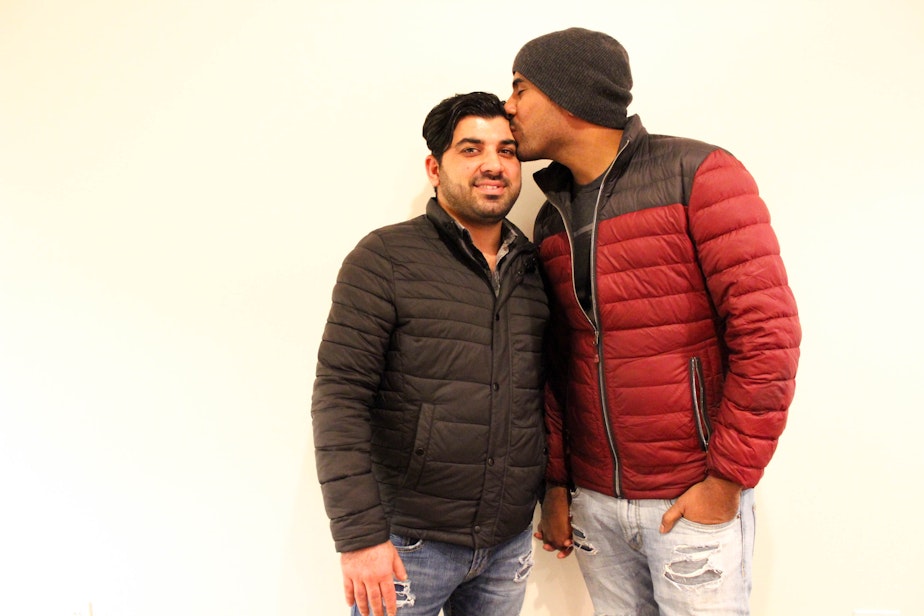They Found Love During The Iraq War. They Found Home In Seattle

This is a story about love and war; love lost and love found again.
In 2004, Nayyef Hrebid was an interpreter for the U.S. Marines in Iraq, and Btoo Allami was a soldier with the Iraqi Army.
Ramadi General Hospital had been taken over by insurgents, and Hrebid and Allami were part of a mission to reclaim the hospital. It was a dangerous mission, in a dangerous city, at a dangerous time in the war.
At night, after the stress of the day was over, the two men would come together in a safe house to recover. They would eat a meal, then sit in the back garden and talk for hours.
Hrebid said those conversations helped keep him sane during a difficult time.
Sponsored
More KUOW: I Keep Telling My Mom I’m Gay – And She Keeps Forgetting
"Because, you know, we see dead people. We fight. So what we talk about is our life and past, about how we feel, about where we like to be in the future," Hrebid said. "And that was very beautiful in that difficult moment."
Neither were openly gay, but they knew they had feelings for each other. After just four days, Allami told Hrebid, "I love you." In response, Hrebid kissed him. Allami said he was so excited, he didn't eat for two days.
But this was Iraq, and being gay was not OK. If they were caught, they could go to jail for 15 years, or worse.
"To be gay in Iraq, it's very dangerous," Hrebid said. "It's losing your life. You get shame to the family. You lose your family, and you lose your friends, you lose everything almost. That is why there is other ways to be gay, just between you and maybe the other person."
Sponsored
For nearly five years, Hrebid and Allami kept their love a secret. Sometimes, friends would help to arrange rendezvous. But they could not love in the open.
Then, in 2009, Hrebid's life became dangerous for another reason. He was targeted by militants for his work as a translator.
"They start writing our names in the street; I cannot meet my family any more, and all my neighborhood knew I work with the Americans, so they call me traitor," he said.
With the help of a U.S. Marine captain, Hrebid was granted asylum and came to live in the United States. He settled in Seattle in 2009. But he had to leave Allami in Iraq.
Sponsored
Allami said he was happy to know that Hrebid was safe and could finally live life as an out gay man. "But me, I live in Iraq. Is now just me, and so difficult," Allami said.
"I was feeling very guilty to leave him behind," Hrebid said.
More KUOW: Caitlyn Jenner, Laverne Cox And My 7-Year-Old Daughter
The two stayed in constant contact, by phone or Skype or other means. Hrebid spent years trying to find a way to bring Allami to live with him in Seattle.
Because of Allami's military history, it was difficult to get permission for him to enter the U.S. Meanwhile, his life had also become dangerous. A relative had discovered that Allami was gay, and Allami feared for his life.
Sponsored
With the help of friends, Hrebid got Allami to safety in Beiruit, Lebanon. Then Hrebid found a way to get Allami to Vancouver, Canada, where Hrebid could come visit him.
They lived across the border from each other and saw each other every week. They married in a small ceremony in Canada on Valentine's Day, 2014.
Finally, in early 2015, the couple got an appointment with U.S. Immigration. Hrebid clearly remembers the day.
More KUOW: When A 14-Year-Old Chooses To Die Because Of Religion, Can Anyone Stop Him?
"That day was one of my biggest days, ever. We went there and I had a bunch of paper, photos and letters to prove our relationship. And the interview was only 10 minutes. She asked specific questions about how we met, how long we've been together, and how we connect with each other. After that she said, 'You've been approved for a visa to live in the United States,'" Hrebid said.
Sponsored
He was shocked and began to cry and scream immediately. "I lost myself. I really lost myself because this finally is happening. We could live together," he said. "I want to wake up to up see him in front me. And when I close my eyes, he's the last face I see."
The two were married on the Olympic Peninsula in August 2015 in what they call their "dream wedding." They now live on Capitol Hill in Seattle. After more than a decade living apart, they are grateful to — at long last — be able to share a roof and a bed.
"We have home," says Allami, "apartment, but ..."
Hrebid jumps in. "It is like a palace, to us."
This segment originally aired Feb. 11, 2016.

